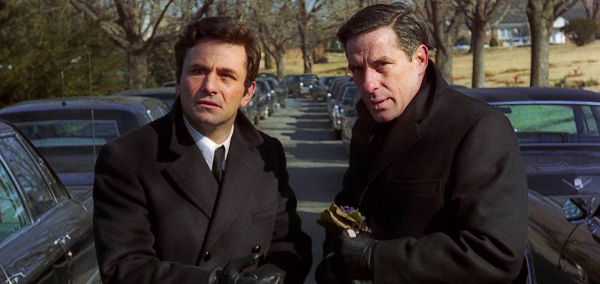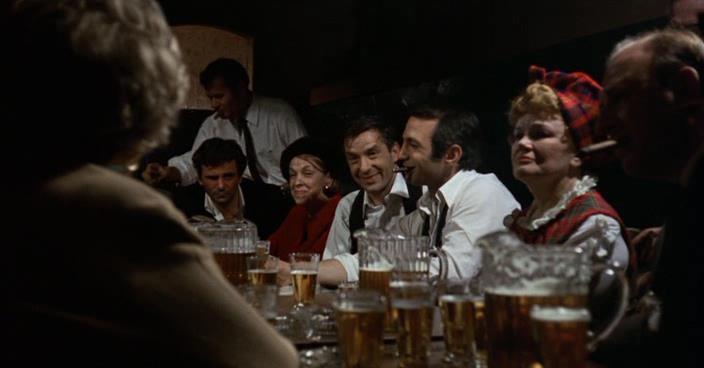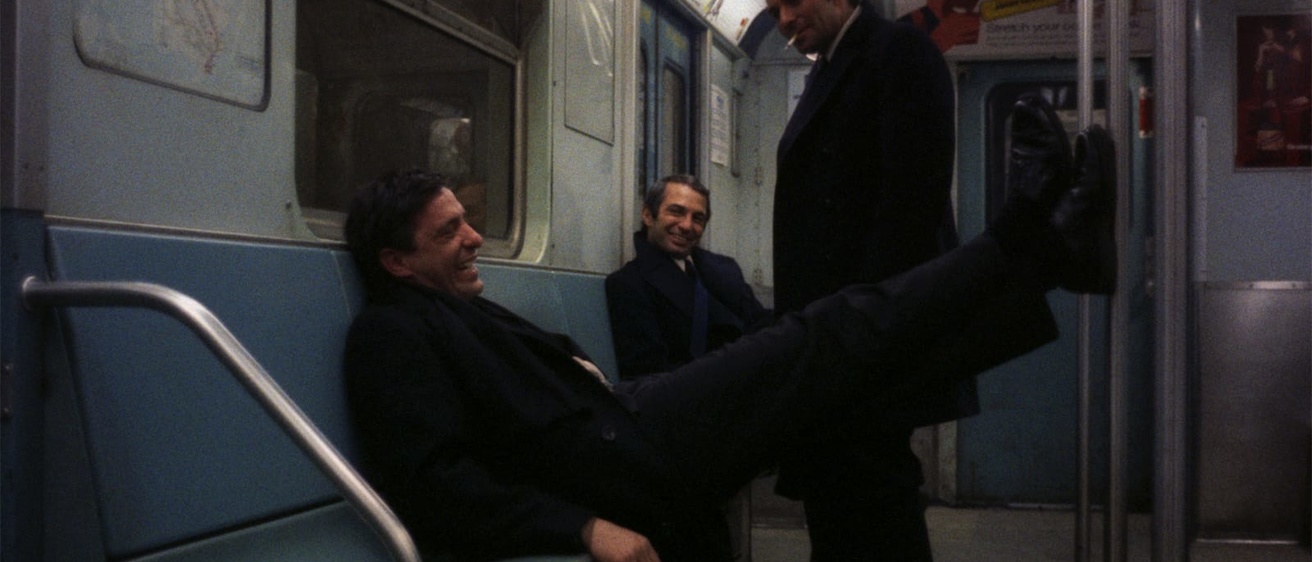Husbands is John Cassavetes’s most abrasive, viscerally unpleasant film. Which is saying something if you’re familiar with his work. I had avoided the film for years because of accounts of its sexism, accounts that I might not entirely agree with but that I can see the basis of in the film. All of Cassavetes' films trap you with emotionally draining characters or situations for their lengthy runtime, but his other films (namely his 1984 independent swan song, Love Streams) anchor them in moments of profound connection between the characters. There is also the presence of Gena Rowlands in these films, a powerful cinematic presence and an essential factor in the cinema of Cassavetes. Husbands is an outlier in the Cassavetes oeuvre because it lacks these aforementioned qualities, at least on a cursory surface glance. However it is precisely this that makes Husbands a notable, if not flawed film in the director’s filmography. All of his films represent him and his actors baring their hearts on the screen, and Husbands feels like a key text for him in this regard, a treatise on male relationships at a transitional point in his career.
On paper, Husbands is the story of three men dealing with grief. In practice, the grief acts as a structuring absence in the film. It begins with a photomontage of the four men and their families together at a pool party, the only time we see Cassavetes and Falk with their wives. The opening scene is a dialogue between Cassavetes and Falk about death at their friend Stuart’s funeral. Falk is disgusted by the formality of the proceeding, embarrassed by the attention their friend is getting. He believes that the two things that will kill someone are “tension and lies.” Visually, this scene also sets up the power dynamic in the friend group. The conversation between Cassavetes and Falk is interrupted periodically with shots of Ben Gazzara’s character, turning to look back at them with disgust, establishing a distance between Gazzara and the other two men.

Throughout the film, Gazzara seems to be the most openly affected by the loss of Stuart, but is uncomfortable bringing it up to the other two men. This reaches a head when he drunkenly yells at them in a bathroom “I could never talk to you, you’re insensitive!” All this leads to is a comic drunken outburst between them. The scene ends with a reconciliation of sorts. The three men are embracing in a tight closeup as Gazzara proclaims, “Like I’ve been telling my wife for years, aside from sex, and she’s very good at it, goddamnit, I like you guys better. I really do… I love you.” After Gazzara gives Falk a kiss, Cassavetes calls him “Fairy Harry,” revealing how insecure these men are about frankly discussing their feelings. This moment was apparently improvised by Cassavetes but it feels notable that it’s his character who says it. If Gazzara is the one who is most outwardly affected by the loss, Cassavetes keeps it the most bottled up. Throughout the film, he uses ill-timed and (in this case, offensive) humor to deflect confronting his feelings. Along with the unspoken grief they’re collectively dealing with, another key theme of the film is the growing distance between Gazzara and the other two men, a distance that is made physical by the end of the film when Cassavetes and Falk return from their impulsive trip to London without him.
Too much of the writing about this movie (and about movies in general these days) is black and white, that is to say, concerned with who the audience is meant to side with in the narrative. According to the popular reviews section on Letterboxd, Husbands must either be an endorsement of male debauchery (negative), or a scathing indictment of the behavior of its three subjects (positive). Both viewpoints do a disservice to Cassavetes’ notorious method for constructing his films. If accounts in the interview book Cassavetes on Cassavetes are to be believed, when the film was pitched he had no screenplay, hastily dictating an early draft only after the producer demanded to see one. The actual construction of the film came from lengthy rehearsal and improvisation sessions with his actors. His reliance on improvisation and secondary treatment of a written screenplay represent one of the foremost qualities of Cassavetes’ work: messiness. Although we have been trained by the bourgeois myth of “objective quality” to regard this as a weakness, I feel quite the opposite. What makes Cassavetes work special is that he’s unafraid to show the messiness of our emotions and the sort of behavior this can lead to. I don’t want to make hasty generalizations, but while we’re on the subject of “messiness” one could say that Husbands is Cassavetes’ messiest film. It is for this very reason that putting its subjects in a positive negative dichotomy does it a disservice.
Certainly the film depicts a lot of ugly behavior but Cassavetes intentions are never so simple. A scene that shows these complications to me occurs in a bar. It starts with the characters at a table of strangers. People are taking turns singing songs. This sequence chugs along for a while, long enough that I was wondering where exactly it was going, before it reaches Leola, an older woman who tries to sing “It was just a little love affair” despite protests from the three men. At this point it becomes an audition where the men pick apart each attempted performance of the song. “Horrible, no passion,” “Honestly, with soul.” “No feeling.” “REAL! REAL! FROM THE HEART!” are a sampling of their notes. There’s a cruel irony to the men chiding this woman’s performance for lacking passion and feeling since the three of them will go on to prove themselves as being utterly incapable of expressing themselves in this way. They’re lashing out at this woman, unconsciously attacking her for their own inadequacies. Although you could argue the film is playing this scene for laughs, I think the punishingly long duration of it renders it painful. These men come across as pathetic. Yet in this moment and others in the film, it isn’t Cassavetes’ intent to simply look down on his subjects but to interrogate them and ask why they are so regressed emotionally.
This scene also carries significance since it’s about performance, a key topic for Cassavetes as an artist that will crop up more in his later films. The drunken critique by the three men almost seems like a version of Cassavetes’ famous method, a search for a deep truth and rejection of artifice. He himself says in the scene, “You’re not speaking to us…” This and the aforementioned lines of dialogue seem too similar to how Cassavetes has described his method for it to be a coincidence. I interpret this as self critique to some extent. The men come off too boorish for us to take them seriously. Even if there are kernels of truth to their observations, they’re applying them in an inappropriate setting.

Detractors of the film might say that it doesn’t editorialize enough, but the character’s actions speak for themselves. These men don’t only lack the capacity to hold relationships with each other, but with the women in their life. As much as grief is a structuring absence in the film, so too are the wives of the titular husbands. According to Ray Carney in Cassavetes on Cassavetes, the filmmaker wanted the film to be titled “Harry, Archie and Gus” before the studio changed it to what we know it as now. I actually find the finished title to be poetic. If we know little about their relationships with their deceased friend, we know even less about their wives. This of course excludes Gazzara, who has a violent encounter with his wife and her mom in the middle. We get an idea of their relations with women in a section near the end when they’ve all returned to their hotel room with women. Cassavetes gets the longest and most unpleasant scene, where he’s trying to get intimate with the woman in his room despite her protest. She wants him to relax and he won’t, constantly vying for control over her and the situation. This theme continues the next morning when he can’t seem to hold a conversation with her in a coffee shop without starting an argument. Falk doesn't come off much better, bullying his Asian girlfriend who literally doesn’t speak the same language as him. Gazzara seems to put off the woman he’s paired with since he can’t stop talking about his relationship with his wife. To varying degrees, these scenes all show men who can’t healthily express the way that they feel.
As previously stated, I don’t think the film is condoning their actions, but Cassavetes also affords these men some empathy. For how deeply he gets into his characters, he can’t help himself. While the behavior in this movie, and perhaps even the impulse to make it, might seem like what we now might term “toxic masculinity,” the fact that he was so concerned with love shows that he goes against the ruggedly masculine image he often put on in interviews. If nothing else, the film serves as a snapshot of masculinity in the era and all of the ugliness that came with it. I do think that some of the themes in the film were more deftly explored in Elaine May’s spiritual successor, Mikey and Nicky, also starring Cassavetes and Falk. The film is also of interest for that reason, as an earlier whack at the similar themes. Each Cassavetes picture comes straight from the heart, with all the messy contradictions that entails, and Husbands is no exception.
